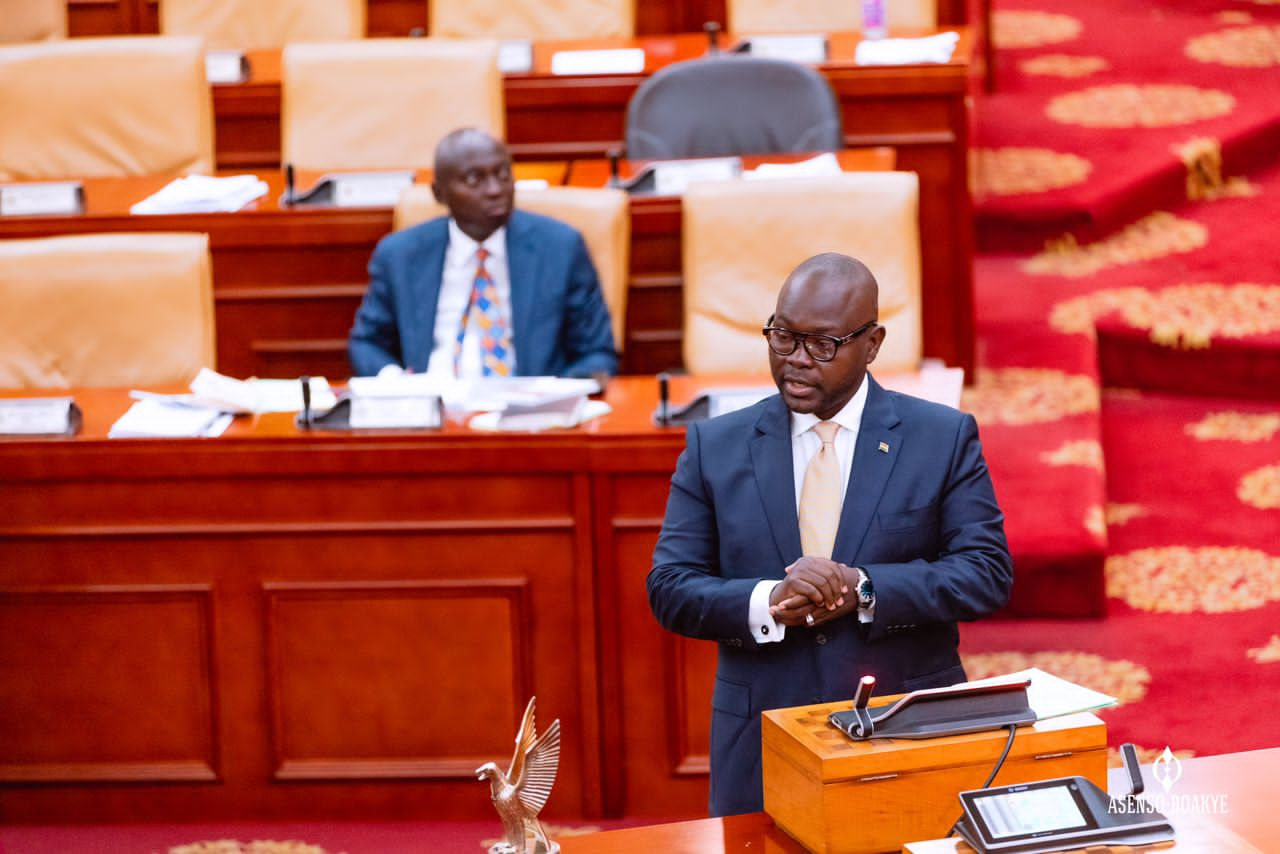The Minister for Works and Housing and MP for Bantama, Hon.Francis Asenso-Boakye on Thursday June 29, 2023 delivered a speech on the floor of Parliament about the recent Flooding incidents in the National Capital and some parts of the country.
There have been some frequent floods in some parts of the country which has taken human lives.
The sector minister took the opportunity to commend the minority Chief Whip , Honourable Kwame Agbodza for raising the issue of perennial Flooding on the floor of Parliament on 23 June, 2023 , and his commitment towards building a robust built environment for our socio- economic development.
During the heavy downpour from Wednesday 21st to Friday 23rd June, 2023, in some parts of Kumasi, in the Ashanti Region, including Bantama, his own Constituency, five(5) lives , two of whom were siblings unfortunately lost their lives., Whiles in Accra some lost their livelihoods and several others suffered damages of their properties and other valuables.
He expressed government commiserations to the bereaved families.
He indicated that the Ministry of Works and Housing is consious of the increasing risk of Flooding across the country, largely due to inadequate drainage infrastructure, improper solid waste disposal, disregard for planning rules and regulations, and rapid urbanization, among others.
He said that the adverse effects of climate change has compounded these factors.
We have in recent times , seen flooding in other urban centres , such as, Kumasi, Sekondi-Takoradi, Koforidua and Tamale that did not use to experience much flooding. Globally, the dire effects of climate change have left unforgettable footprints in many countries such as ,lvory Coast, Sierra Leone and Nigeria, among others,and Ghana is no exception.
For this reason, the ministry has over the years initiated and implemented major drainage projects across the country to mitigate flooding.
Read the Full Statement:
STATEMENT DELIVERED BY FRANCIS ASENSO-BOAKYE (MP), MINISTER FOR WORKS AND HOUSING TO PARLIAMENT ON MEASURES BEING TAKEN TO ADDRESS FLOODS

1. Mr. Speaker, I thank you for the opportunity to address this august House on the recent flooding incidents in the National Capital and elsewhere in the country. I would, also, like to commend the Minority Chief Whip, Honourable Kwame Agbodza for raising the issue of perennial flooding on the floor of Parliament on 23 June 2023, and his commitment towards building a robust built environment for our socio-economic development.
2. May I, first of all, express the government’s and my commiserations to the bereaved families for the loss of their loved ones during the heavy downpour from Wednesday 21st to Friday 23rd June, 2023, in some parts of Kumasi, in the Ashanti Region, including my beloved Bantama Constituency where five (5) lives, two of whom were siblings were unfortunately lost.
3. Here in Accra, some lost their livelihoods while several others suffered damages of their properties and other valuables.
4. My sympathies are with these families during this challenging period. Our follow-ups, however, indicate that the rainfall experienced in Accra on Thursday, 22nd June did not, fortunately, result in any loss of life.
5. Mr. Speaker, the Ministry of Works and Housing is conscious of the increasing risk of flooding across the country, largely due to inadequate drainage infrastructure, improper solid waste disposal, disregard for planning rules and regulation, and rapid urbanization, among others.
6. The adverse effect of climate change has compounded these factors. Consequently, we have in recent times, seen flooding in other urban centres, such as, Kumasi, Sekondi-Takoradi, Koforidua and Tamale that did not use to experience much flooding. Globally, the dire effects of climate change have left unforgettable footprints in many countries, such as, Ivory Coast, Sierra Leone and Nigeria, among others, and Ghana is no exception.
7. For this reason, the Ministry has over the years initiated and implemented major drainage projects across the country to mitigate flooding.
8. As a demonstration of our commitment to tackling Ghana’s perennial flooding challenge, the Government of President Nana Addo Dankwa Akufo-Addo has been implementing a comprehensive flood control and management programme with the following components:
i. The Construction of Drainage Channels and Desilting under the National Flood Control Programme;
ii. Regular Monitoring of Flood Prone Areas to assess our preparedness and educate the public via multiple media channels on flood prevention practices;
iii. Collaboration with Other Ministries, namely; the Local Government, Decentralisation and Rural Development; and National Security to prevent development in waterways and drainage reservations;
iv. Investment in flood mitigations measures under the Greater Accra Resilient and Integrated Development (GARID) Project; and
v. Collaboration with other Government Agencies, namely the Ghana Meteorological Agency, the Water Resources Commission and NADMO toward the issuance of early warning notices.
9. Mr. Speaker, in line with our dedication to building resilient communities and decreasing the occurrence of flooding, Government embarked on the National Flood Control Programme in 2018 and 2020.
10. The aim has been to allocate resources towards enhancing the flood resilience of our vulnerable communities. Since 2018, the Government has committed GHS 450 million to this programme, making it the most substantial investment from Ghanaian government funding sources dedicated to addressing flooding. Under the Programme, 384 desilting projects and 202 drainage channel construction projects were initiated.
11. To date, 370 desilting projects, representing 96% have been completed and 84 drainage channel construction projects representing 42% have been completed, with the remaining 118 at various stages of completion.
12. The effect has been the mitigation of flood hazards in beneficiary communities such as Kuntunse Satellite, Achimota Mile 7, Katamanso, Mamprobi, Abeka-Ayigbe Town, Labadi Olympia, Nungua (United Church Area), Haatso, Madina Firestone, Madina Mayehot, Madina Redco, Madina Oblogo, Dome Crossing, Weija GEICEL, Kasoa Iron City, Kasoa Obom, Nsuoano stream in Ngleshie Amanfrom and Ashaiman.
13. Mr. Speaker, other selected flood hot spots that are benefitting from the 2020 Programme include Kasoa Millennium City, Adenta Sakora, Nsakyi, Ablekuma, Dawhyenya Dome Railway Crossing, New Legon, Adenta, Sango and Naapladjor Drains, Kakum River, Birim River, Leprosarium Drain, Densu River, Korkordjor River, Owabi River, Sefwi Wiaso, Aboabo Drain, to name a few.
14. Mr. Speaker, ahead of the pending rainy season, I embarked on a working visit of some flood prone communities in Accra, with Technical staff of the Ministry, and the Ghana Hydrological Authority to ascertain our level of preparedness and gain first-hand insight into the challenges we face when it comes to mitigating the risks associated with flooding.
15. Mr. Speaker, it became more evident that human activities are severely impeding the government’s efforts to tackle the issue of flooding. The observations include:
• Filling of lagoons and wetlands with construction materials for development purposes;
• Building on drainage channels, hence blocking the free flow of stormwater;
• Dumping of solid waste in drains, thereby reducing their capacity to hold stormwater; and
• Gaps in the enforcement of planning laws and building regulations by the MMDAs.
16. Subsequently, Mr. Speaker, Cabinet at its Forty-Seventh (47th) meeting held on Saturday, 25th March, 2023, considered a report on my inspection of the drainage infrastructure in Accra. Cabinet noted the need to consider flooding in Ghana as a national security issue, since effective law enforcement has a major role to play in addressing the challenge. Subsequently, Cabinet constituted a committee to develop a comprehensive plan with appropriate measures to strengthen the enforcement of laws relating to lands and siting of buildings.
17. The Committee comprises the following Ministers:
i. National Security – Chairperson
ii. Local Government, Decentralisation and Rural Development;
iii. Sanitation and Water Resources;
iv. Works and Housing; and
v. Lands and Natural Resources.
18. Mr. Speaker, while the committee does its work, my Ministry will continue its engagement with the Ministry of National Security in seeking support for the Assemblies to enforce planning laws and building regulations.
19. My Ministry will also continue engagement with the Ministry of Local Government, Decentralisation, and Rural Development to strengthen the support provided to the Assemblies in addressing the issue of buildings in waterways and drainage buffers.
20. Mr. Speaker, another important component of Government’s holistic approach to addressing flooding in vulnerable communities is the investment in the Greater Accra Resilient and Integrated Development (GARID) Project. Through GARID, the Government is partnering with the World Bank to invest USD 200 million towards reducing flood risks and addressing solid waste management challenges in the Odaw Drainage Basin.
21. The project is being implemented by the Ministry of Works and Housing; Ministry of Sanitation and Water Resources; and the Ministry of Ministry of Local Government, Decentralisation, and Rural Development.
22. Ahead of the rainy season, the project has provided financial assistance to 17 Metropolitan, Municipal, and District Assemblies (MMDAs) in the Odaw Catchment for desilting key drainage channels within their respective jurisdictions. These include; Ayawaso Central, North, East, and West, La Nkwantanang, Ga East, Adentan, La Dadekotopon, Ga West, Ga North and Ga Central. This initiative has contributed to the mitigation of floods by improving the capacity of tertiary drains.
23. Mr. Speaker, other interventions under the Project include drainage improvement works at Achimota, Nima, and Kaneshie as well as participatory community upgrades in Alogboshie, Akweteyman and Nima.
24. The procurement process for the dredging of the Odaw Drainage Channel, Drainage Improvement Works at Achimota, Nima and Community Upgrades in Alogboshie and Akweteyman are almost completed. Construction expected to commence in the third quarter of this year, following the implementation of Resettlement Action Plan.
25. Another significant measure involves the construction of retention ponds in the Ghana Atomic Energy Commission area. These ponds are designed to hold substantial amounts of water that would otherwise flow directly toward the city centre and contribute to flooding. Our Technical Team is currently working with the design consultant to finalize all outstanding designs.
26. Mr. Speaker, in addition to implementing the structural measures outlined above, we are also actively engaged in implementing non-structural measures, regarding the GARID project.
27. These include the establishment of the Flood Early Warning System (FEWS) for the Greater Accra Region, as well the implementation of a Social and Behavioural Change Campaign.
28. Through the Early Warning System, individuals residing in vulnerable communities will receive advanced notifications of potential flooding occurrences, enabling them to take necessary precautions to safeguard their lives, properties and livelihoods.
29. While we have made significant progress, we recognize the pressing need to establish more dependable drainage infrastructure across the country to enhance resilience within our communities. Since assuming office, Mr. Speaker, the Ministry has actively engaged with the Ministry of Finance in order to secure the necessary financial resources required to fulfill this objective.
30. Mr. Speaker, let me highlight that despite the Ministry’s extensive efforts, the impact of Government’s investment in mitigating flood risks is seriously undermined by human activities.
31. It is important for citizens to support the Government’s endeavors by adhering to the rules and regulations governing settlement planning. Additionally, it is essential for citizens to refrain from engaging in development activities within wetlands, waterways and drainage buffers.
32. Furthermore, it is even more critical for citizens to exercise caution in managing household solid waste and refrain from using drainage channels as dumping grounds for refuse. By so doing, we can collectively work towards reducing the vulnerability to flooding and ensuring the effectiveness of the implemented measures.
33. Mr. Speaker, I wish to take this opportunity to urge our revered Traditional rulers, religious and community leaders, civil society groups, and the media to rally behind the Government’s efforts in flood control.
34. We can collectively contribute by alerting the appropriate state authorities in instances where construction is taking place on waterways and other prohibited locations to take prompt action.
35. Mr. Speaker, the Ghana Meteorological Agency has indicated that the East Coast of the country starting from Saltpond to Aflao is expected to have above average rainfall this year. I urge the media to help make this notice current and relevant, and raise public awareness about the hazards involved in traversing on foot or by vehicle during flash floods.
36. Mr. Speaker, the scale of the flooding challenge we face is enormous and with the effect of climate change, it will only get worse. In the light of that, I wish to take this opportunity to emphasize the need for a dedicated source of funding towards tackling flooding in the country. The Ghana Hydrological Authority Act, 2022 (Act 1085), which was passed with support from both sides of the House makes provision for the establishment of a Hydrological Fund for that purpose.
37. I therefore wish to invite this August House to give serious consideration to committing a proportion of the Road Fund, given the impact of drains on the lifespan of roads; the Sanitation Levy, in view of the effect of the solid waste on drainage capacity; and the Common Fund, recognizing the need for a holistic and efficient drainage system.
38. By doing so, we will clearly showcase our nation’s unwavering dedication to addressing this age-long challenge in a comprehensive manner.
39. In conclusion, Mr. Speaker, I implore every citizen to unite and rally behind our collective efforts in tackling the devastating issue of floods. Let us join hands, combining our efforts to bring an end to the destructive consequences caused by flooding. Together, we have the power to effect substantial change and establish a safer and more resilient environment for all.
40. I thank you once again for the opportunity, Mr. Speaker, and may God bless our homeland Ghana.
Page 13 of 15


